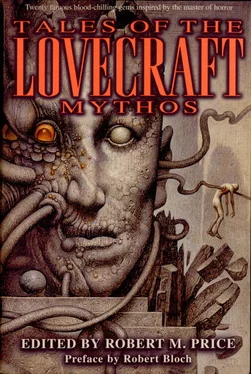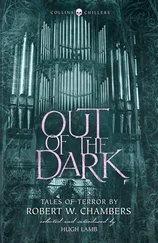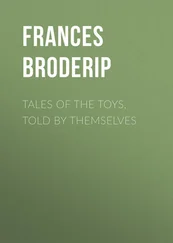Bates smiled slightly. “Well, for one thing, his pet theory about a form of undersea life. He had some wild idea that somewhere in the unplumbed ocean depths there exists a highly developed kind of mollusk capable of emulating certain characteristics of those life forms it devours.
“That was his original theory. In later years he apparently cloaked it with a pattern of demonology and what amounted to a modern adaptation of prehistoric superstition and folklore. He believed that these super undersea species are the incarnation of those Elder Gods who ruled the antediluvian deep and whose existence has been brought down to us in the dark myths and legends of a primitive past; that commanded by the great Cthulhu, they have lain dormant these eons in the sunken city of Flann, awaiting the time they would rise again to feed and rule. He believed further that this metempsychosis of the Elder Gods carried with it a latent incredible power and that if he could aid them to their destiny some of that power would be transmitted to him. Oh, Horatio really went all out in this mystic fol-de-rol. I even overheard him promise his brother, Edmund, all kinds of maledictions if he continued to ridicule his beliefs.”
“Curious,” said Miss Rhodes. “How old a man was Horatio?”
“Old enough to know better. Somewhere near fifty, I should say.”
To Miss Rhodes’ disappointment, the painting of the portrait had little effect on Edith Halbin. The Bristol girl continued to haunt the library, lost in the conchologist’s deep-sea world of print. The more fantastic, the more macabre, the books and manuscripts were, the more absorbed she became in them. When she went about her everyday household tasks she did so mechanically, her mind obviously far removed from work. Yet Miss Rhodes refused to become unduly alarmed. Edith had always been an impressionable person. The artist reasoned that her friend would return to normalcy as soon as her fancy passed.
It was about this time that the sound began. It began as a subdued murmur, with only her vague awareness at first, so low that she took it to be another manifestation of the high blood pressure which had mildly troubled her for some time. Day by day it continued sporadically, now growing, now lessening in intensity; at times it would be gone and she thought with relief she was rid of it. Then it would return louder and more persistent than before. When she asked Edith if she heard anything unusual, the Bristol girl only looked blank.
The physician in Harley Street she finally consulted gave her a routine examination. “I can find nothing wrong with you,” he said. “The auditory canals seem normal in all respects. A murmuring sound, you say?”
Miss Rhodes nodded. “Yes. A low throbbing as if… well, as if a large hollow shell were placed against the ear and held there…
He looked a little puzzled, went into a vague discourse on psychosomatic symptoms and ended by prescribing a mild sedative.
April slipped into May, the sound continued, and Miss Rhodes’ companion grew more restive. She became careless in her dress and forgetful in her speech. What was worse, she took to sleep-walking. On three successive nights Miss Rhodes, always a light sleeper, was awakened by the sound of steps on the uncarpeted floor of the outer corridor. The last night, tiptoeing to her door, she had seen Edith walk slowly, stiffly past and with robot-like movements descend the staircase to the ground floor. At the entrance of the library in the dim glow of the night light she paused a moment before entering.
Miss Rhodes stood by her door hesitantly. She had read somewhere that to awaken a somnambulist in the midst of his meandering might induce shock. Nevertheless, she couldn’t let her friend move about in this condition at random. She hurried down the stairs.
The library was in total darkness, but when she switched on the light, the sight she saw held her rigid for an instant. Edith had drawn up a chair in the middle of the room and sat there stiffly erect staring at the aquarium. Her hands hung at her sides; her head was slightly tilted downward like a bird watching.
There was something quietly horrible about the taut posture, her sightless concentration. Miss Rhodes touched her on the shoulder. She said gently, “You must have dozed off. I told you not to read so much. Come to bed.”
It was a curious fact that the sleep-walking incident marked the end of that chain of events which had so disturbed Miss Rhodes. As if by magic, Edith roused herself from the mood which had gripped her since coming to this house. And, as if by magic, too, the murmuring sound dwindled and finally passed away. The very weather underwent a change, overcast days giving way to those of brightest sunshine.
Yet deep within Miss Rhodes was the conviction that it was the pause before the storm.
On the night of the nineteenth of May, she was working in the conservatory-studio, doing a new painting. For an hour Edith had silently watched her friend wield her brushes. Then she rose to her feet.
“I have some letters to write,” she said.
Miss Rhodes nodded, absorbed in her work. Across on the far wall, the pendulum clock pushed its ticks through the quiet. The air was sultry. Outside a light rain was beginning to fall, and the smell of wet earth drifted through the open window.
The painting, a still life, was going well, far better than the portrait of Edith, and Miss Rhodes worked with enthusiasm. Perhaps a half hour passed before she became conscious of the silence of the house. Silence pervaded the conservatory like a living entity through which the faint hushing of her brush strokes sounded unnaturally loud. Frowning a little, she went to the connecting door and stood there, listening. There was no sound in the house — no creaking of a chair, no rustling of a paper, nothing. A little chill of unease began to move up her spine.
“Edith!” she called hesitantly. “Are you all right?”
Her voice went bounding down the corridor to stir up a fusillade of echoes, but brought no reply.
Miss Rhodes put down her brush and palette and headed for the library. She reached the entrance and halted uncertainly. The door was locked. She knocked on the panel.
“Edith!” she called. “Let me in.”
That same ringing silence answered her. Again she pounded on the door.
“Edith! Why don’t you answer?”
Her unease gave way to alarm. She turned and ran down the corridor to the kitchen where a master key hung from a hook on the wall. A moment later, she had unlocked the library door and entered the room.
At first glance, she thought the room was empty. Her eyes lowered to the floor and she advanced several steps. For a long moment she stood there, looking down. A dribble of saliva ran from a corner of her mouth. Then she turned very quietly and left the room.
The rain, coming down harder, wrapped itself about her as she went out the door and down the outside steps to the street. She walked down Haney Lane to Brompton Road, heading south east toward Embankment. She moved into Basil Street and followed Basil into Walton, threading her way blindly through the night traffic, unaware of her surroundings, not knowing where she was or where she was going. She entered Pont Street and as she went on, she saw again in her mind’s eye what she had seen in the library — the sight which would live forever in her memory — the body of Edith Halbin lying limp on the floor… a body that was all but unrecognizable because the head and face had been partially devoured! And the aquarium that no longer showed a milky grey solution, was now a sickening pink. And most hideous of all — the marks on the floor, the still wet red convolutions extending from the aquarium to the body of Edith Halbin and from there back to the tank again — marks that might have been made by some crawling thing, satiated and slobbered with blood.
Читать дальше












